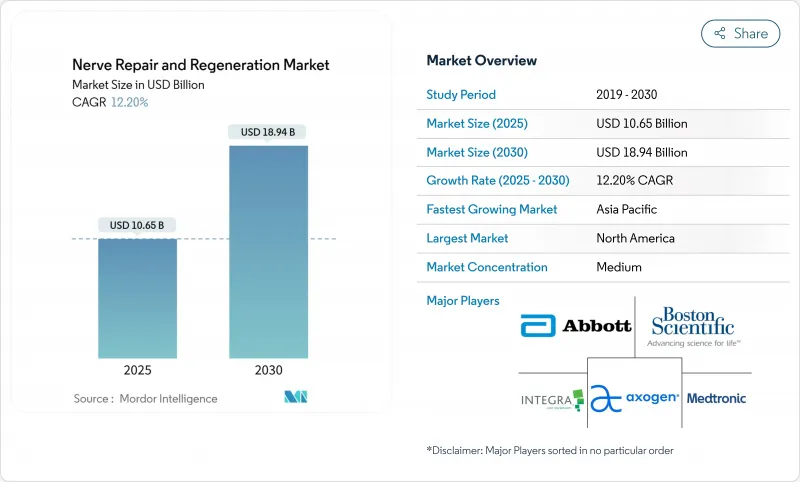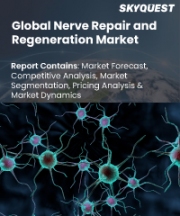
|
시장보고서
상품코드
1836686
신경 수복 및 재생 시장 : 시장 점유율 분석, 산업 동향, 통계, 성장 예측(2025-2030년)Nerve Repair And Regeneration - Market Share Analysis, Industry Trends & Statistics, Growth Forecasts (2025 - 2030) |
||||||
신경 수복 및 재생 시장의 2025년 시장 규모는 106억 5,000만 달러로 추정되고, 2030년에는 189억 4,000만 달러에 이를 것으로 예측되며, 예측 기간 CAGR 12.20%로 성장할 전망입니다.

바이오 일렉트로닉스 의료의 지속적인 진보, 신경 질환 부담 증가, 공적 자금 지원이 이러한 확대를 지원합니다. AI를 활용한 폐쇄 루프 신경 자극, 3D 바이오프린트를 통한 환자 특이적 신경 이식, 실시간 뇌 신호 모니터링 시스템은 반응적인 치료에서 정밀한 유도로 재생으로 임상 진료를 재형성하고 있습니다. 이러한 기술 혁신의 채용이 가속화됨에 따라 신경 수복 및 재생 시장에서 장비와 생체 재료의 두 가지 범주에 새로운 기회가 생깁니다. 수요는 당뇨병과 관련된 말초신경장애를 많이 경험하는 고령화 사회로의 인구 동태 변화나, 고도의 재건 요법을 필요로 하는 전장 및 산업에서의 외상 증가에 의해 강화되고 있습니다. 북미의 견고한 상환, 아시아태평양의 미개척 대규모 환자 수영장, 신흥 생명 공학 기업에 대한 풍부한 벤처 자금이 세계 성장 전망을 지원합니다.
세계의 신경 수복 및 재생 시장 동향 및 인사이트
신경 손상 및 신경 질환의 발생률 증가
상지 신경 손상은 미국에서 연간 100만 명당 43.8명이 걸렸으며, 1건 당 평균 치료비는 4만 7,004달러입니다. 당뇨병과 관련된 말초 신경 장애와 연령 관련 신경 퇴행은 재생 개입 후보자를 더욱 증가시킵니다. 그 부담은 급성 외상뿐만 아니라 장기적인 장애에까지 미치고 있으며, 의료 제도는 조기 신경 재건을 받아들이도록 촉구하고 있습니다. 군사 분쟁이나 산업 사고는 말초신경 외상을 정책 과제로 다루고 있는 한편, 신경병태생리학의 이해가 깊어지면, 선진적인 치료법의 대상이 퍼집니다. 이러한 패턴을 종합하면 신경 수복 및 재생 시장의 대응 가능한 인구가 확대됩니다.
신경 조절 및 생체 재료의 기술적 진보
메드트로닉 신경 자극기 Percept RC는 실시간 뇌 신호를 포착하고 치료법을 개별화합니다. 폐쇄 루프 제어는 정적 개입에서 동적 개입으로의 전환을 의미하며 예후를 개선하고 부작용을 줄일 수 있습니다. 동시에, 뉴로트로핀-3이 내장된 3D 바이오프린트 키토산 도관은 말초 수리를 위한 바이오닉 미세환경을 만듭니다. 전기 자극과 결합된 전도성 실크 피브로인 스캐폴드는 전임상 회복 지표에서 전통적인 가이드를 능가합니다. 이러한 혁신은 바이오 머티리얼을 재생의 첫 번째 옵션으로 자리매김하고, 신경 수복 및 재생 시장에서 제품 믹스의 큰 전환을 시사합니다.
임플란트 및 치료의 높은 비용
척수 자극 장치는 수술 비용을 제외하고 임플란트 1개당 2만-5만 달러이며, 평생 비용은 보험 적용 지역에서도 10만 달러를 초과할 수 있습니다. 의료 등급 컴포넌트 공급망 부족은 가격을 매달아 리드 타임을 늘립니다. 초기 비용이 높기 때문에 낮은 자원 환경에서의 조기 도입이 방해되어 신경 수복 및 재생 시장에서 첨단 기술의 보급이 늦어지고 있습니다.
보고서에서 분석된 기타 촉진요인 및 억제요인
- 의료비 증가 및 유리한 상환 제도
- AI를 활용한 클로즈드 루프형 바이오 일렉트로닉스 의료 도입
- 연결된 임플란트의 사이버 보안 및 데이터 프라이버시 위험
부문 분석
신경 자극 및 신경 조절 장치는 풍부한 임상 증거, 외과 의사의 숙련도, 확립된 상환 채널을 배경으로 2024년 신경 수복 및 재생 시장 점유율의 59.35%를 차지했습니다. 같은 해 바이오 머티리얼은 초기 인간 안전성 벤치마크를 클리어한 자가섬유아세포 유래의 비계 도관에 의해 수요 패턴을 재구성하기 시작했습니다. 생체재료와 관련된 신경 수복 및 재생 시장 규모는 환자 고유의 이식편을 만드는 3D 프린팅과 제어된 신경영양 인자를 전달하는 키토산 도관을 타고 CAGR 14.25%를 보일 것으로 예측됩니다.
내부 신경 자극 장치는 평균 판매 가격이 높고 만성 신경 병증 통증, 파킨슨 병, 척수 손상과 같은 적응증이 선호되며 판매를 독점하고 있습니다. 경두개 자기 장치와 경피 전기 장치를 포함한 외부 자극 장치는 재활 치료에서 꾸준히 보급되고 있습니다. 금 나노입자를 운반하는 전도성 실크 피브로인 스캐폴드는 전임상 연구에서 탁월한 축삭 성장을 가져오고 기존 리드의 향후 대체 가능성을 시사합니다. 바이오 패브리케이션의 비용 곡선이 감소하고 임상 데이터가 성숙함에 따라 바이오 머티리얼은 신경 수복 및 재생 시장의 장기적인 제품 구성을 변화시킬 준비가 되어 있습니다.
지역 분석
북미는 고급 보험 적용, 깊은 임상시험 밀도, NINDS 예산 28억 3,300만 달러 등 지속적인 공적 연구개발 투자를 배경으로 2024년 41.82%의 매출 점유율을 유지했습니다. DARPA의 Bridging the Gap Plus 프로그램과 6억 5,000만 달러의 군사 열상 연구 프로그램에 의한 군사 연구가 말초 신경 수복 기술 혁신을 더욱 가속화시킵니다. 캐나다는 공평한 접근을 지원하는 국민 모두 보험제도에 의해 또 멕시코는 의료 투어리즘의 패키지에 의해 국경을 넘은 수술 건수를 증가시킵니다. FDA에 의한 사이버 보안 규정은 장비 인증 기준을 형성하고 세계 수출의 성공을 좌우합니다.
아시아태평양의 CAGR은 12.61%로, 이 지역에서 가장 높은 페이스가 될 것으로 예측되며, 이는 대규모 환자 풀과 정부에 의한 브레인 컴퓨터 인터페이스의 적극적인 추진에 추진되고 있습니다. 중국 국가 헬스케어 안전관리국이 신경케어 서비스를 정식으로 인정하고 상환 확대에 길을 열었습니다. 일본은 고도의 엔지니어링 및 신경 질환의 유병률이 높은 고령화된 인구구성이 공헌하고 있습니다. 인도는 사립 병원의 확대와 지역의 의료 관광을 유치하는 저렴한 비용의 절차 가격으로 전진하고 있습니다. 호주는 세계 최초의 후각초세포 임상시험을 통해 트랜스레이셔널 리서치의 허브로서의 지위를 확립하고 있습니다.
유럽은 협조적인 의료 제도 및 의료기기의 도입으로 견조한 점유율을 유지하고 있습니다. 독일은 산업 디자인의 강점을 살리고 영국은 초기 단계의 줄기 세포 연구를 선도하고 있습니다. 의료기기 규칙에 따른 규제의 조화는 각 대륙의 승인을 간소화하고 차세대 임플란트의 보급을 가속화합니다. 중동 및 아프리카에서는 전문의의 수가 한정되어 있기 때문에 보급이 진행되지 않는 것, 도시에서의 첨단 급성기 의료 센터의 확대가 시작됩니다. 남미에서는 브라질 및 아르헨티나가 신경 의학에 대한 예산 배분을 늘리고 신경 수복 및 재생 시장이 세계적으로 보급되고 있는 동안 꾸준한 개선을 보여줍니다.
기타 혜택 :
- 엑셀 형식 시장 예측(ME) 시트
- 3개월간의 애널리스트 서포트
목차
제1장 서론
- 조사의 전제조건 및 시장 정의
- 조사 범위
제2장 조사 방법
제3장 주요 요약
제4장 시장 상황
- 시장 개요
- 시장 성장 촉진요인
- 신경 손상 및 신경 질환 증가
- 신경 조절 및 바이오머티리얼의 기술 진보
- 헬스케어 지출 증가 및 유리한 상환금
- AI를 활용한 클로즈드 루프 바이오 일렉트로닉스 의료의 채용
- 말초 신경 복구를 위한 군과 엘리트 스포츠에 대한 자금 제공
- 3D 바이오프린트, 환자 특이적 신경 그래프트의 획기적 진보
- 시장 성장 억제요인
- 임플란트 및 치료의 높은 비용
- 훈련을 받은 신경외과의 및 재활 전문의의 부족
- 의료 등급의 폴리머(키토산, PTFE) 공급 제약
- 커넥티드 임플란트의 사이버 보안 및 데이터 프라이버시 위험
- Porter's Five Forces 분석
- 신규 참가업체의 위협
- 구매자의 협상력
- 공급기업의 협상력
- 대체품의 위협
- 경쟁 기업간 경쟁 관계
제5장 시장 규모 및 성장 예측 : 금액(달러)
- 제품 유형별
- 신경 자극 및 신경 조절 기기
- 내부 신경 자극 기기
- 척수 자극(SCS)
- 뇌심부 자극(DBS)
- 미주 신경 자극(VNS)
- 천골 신경 자극(SNS)
- 위 전기 자극(GES)
- 체외식 신경 자극 기기
- 경피적 전기 신경 자극(TENS)
- 경두개 자기 자극(TMS)
- 생체 재료
- 신경 도관
- 신경 프로텍터
- 신경 커넥터
- 기타 바이오 재료
- 신경 자극 및 신경 조절 기기
- 용도별
- 신경 자극 및 신경 조절 수술
- 직접신경수복 및 신경박리술
- 신경 이식
- 줄기세포 치료
- 기타 용도
- 최종 사용자별
- 병원
- 외래수술센터(ASC)
- 신경 및 정형외과 전문 클리닉
- 재활센터
- 지역별
- 북미
- 미국
- 캐나다
- 멕시코
- 유럽
- 독일
- 영국
- 프랑스
- 이탈리아
- 스페인
- 기타 유럽
- 아시아태평양
- 중국
- 일본
- 인도
- 한국
- 호주
- 기타 아시아태평양
- 중동 및 아프리카
- GCC
- 남아프리카
- 기타 중동 및 아프리카
- 남미
- 브라질
- 아르헨티나
- 기타 남미
- 북미
제6장 경쟁 구도
- 시장 집중도
- 시장 점유율 분석
- 기업 프로파일
- Medtronic plc
- Boston Scientific Corp.
- Abbott Laboratories
- Stryker
- Integra LifeSciences Corporation
- LivaNova
- Axogen Corporation
- Baxter
- Neuronetics
- NeuroPace
- Phagenesis
- MyndTec
- CheckPoint Surgical
- Synapse Biomedical
- Polyganics
- Renishaw
- Collagen Matrix
- BlueWind Medical
- ElectroCore
- Stimwave
제7장 시장 기회 및 전망
AJY 25.10.27The nerve repair and regeneration market is valued at USD 10.65 billion in 2025 and is projected to reach USD 18.94 billion in 2030, reflecting a 12.20% CAGR over the forecast period.

Continued progress in bioelectronic medicine, the growing burden of neurological disorders, and supportive public funding anchor this expansion. AI-enabled closed-loop neurostimulation, 3D-bioprinted patient-specific nerve grafts, and real-time brain-signal monitoring systems are reshaping clinical practice from reactive procedures to precision-guided regeneration. Intensifying adoption of these innovations reveals fresh opportunities across both device and biomaterial categories inside the nerve repair and regeneration market. Demand is reinforced by a demographic shift toward aging populations that experience more diabetes-linked peripheral neuropathies and by increasing battlefield and industrial traumas that require advanced reconstruction therapies. Robust reimbursement in North America, large untapped patient pools in Asia-Pacific, and deep venture funding for emerging biotechnology firms together underpin the global growth outlook.
Global Nerve Repair And Regeneration Market Trends and Insights
Growing Incidence Of Nerve Injuries & Neurological Disorders
Upper-extremity nerve injuries affect 43.8 per million people annually in the United States, with average charges of USD 47,004 per case. Diabetes-linked peripheral neuropathy and age-related neurodegeneration further enlarge the candidate pool for regenerative interventions. The burden extends beyond acute trauma to long-term disability, pushing health systems to embrace earlier nerve reconstruction. Military conflicts and industrial accidents keep peripheral nerve trauma on policy agendas, while better understanding of nerve pathophysiology broadens eligibility for advanced therapies. Collectively these patterns expand the addressable population in the nerve repair and regeneration market.
Technological Advances In Neuro-Modulation & Biomaterials
Medtronic's Percept RC neurostimulator captures real-time brain signals and personalizes therapy delivery. Closed-loop control represents a shift from static to dynamic intervention, potentially improving outcomes and lowering adverse events. Concurrently, 3D-bioprinted chitosan conduits embedded with neurotrophin-3 create bionic microenvironments for peripheral repair. Conductive silk-fibroin scaffolds combined with electrical stimulation have surpassed traditional guides in preclinical recovery metrics. These breakthroughs position biomaterials as a regeneration-first alternative, signalling a major product-mix shift inside the nerve repair and regeneration market.
High Cost Of Implants & Procedures
Spinal cord stimulators range from USD 20,000 to USD 50,000 per implant, excluding surgical expenses, and lifetime costs can surpass USD 100,000 even in insured regions. Supply chain shortages in medical-grade components have inflated prices and elongated lead times. High up-front costs dampen early adoption in low-resource settings and slow diffusion of advanced technologies in the nerve repair and regeneration market.
Other drivers and restraints analyzed in the detailed report include:
- Rising Healthcare Expenditure & Favourable Reimbursement
- AI-Enabled Closed-Loop Bio-Electronic Medicine Adoption
- Cyber-Security & Data-Privacy Risks In Connected Implants
For complete list of drivers and restraints, kindly check the Table Of Contents.
Segment Analysis
Neurostimulation and neuromodulation devices accounted for 59.35% of the nerve repair and regeneration market share in 2024, powered by extensive clinical evidence, surgeon familiarity, and established reimbursement channels. Within the same year, biomaterials began reshaping demand patterns through scaffold-free conduits derived from autologous fibroblasts that passed early human safety benchmarks. The nerve repair and regeneration market size tied to biomaterials is expected to grow at 14.25% CAGR, riding on 3D-printing that fabricates patient-specific grafts and chitosan conduits delivering controlled neurotrophic factors.
Internal neurostimulators dominate revenue with higher average selling prices and preferred indications like chronic neuropathic pain, Parkinson's disease, and spinal injury. External stimulators, including transcranial magnetic and trans-cutaneous electrical devices, post steady uptake in rehabilitation therapy. Conductive silk-fibroin scaffolds loaded with gold nanoparticles are yielding superior axonal growth in preclinical work, hinting at future substitution potential for traditional leads. As cost curves of biofabrication decline and clinical data matures, biomaterials are poised to transform long-term product mix inside the nerve repair and regeneration market.
The Nerve Repair and Regeneration Market Report is Segmented by Product Type (Neurostimulation and Neuromodulation Devices, and Biomaterials), Application (Neurostimulation and Neuromodulation Surgeries, Direct Nerve Repair / Neurorrhaphy, and More), End-User (Hospitals, Ambulatory Surgical Centres, and More), and Geography (North America, Europe, Asia-Pacific, and More). The Market Forecasts are Provided in Terms of Value (USD).
Geography Analysis
North America retained 41.82% revenue share in 2024 on the back of advanced insurance coverage, deep clinical trial density, and continuous public R&D investment such as the USD 2.833 billion NINDS budget. Military research through DARPA's Bridging the Gap Plus program and the USD 650 million Military Burn Research Program further accelerates innovation in peripheral nerve repair. Canada adds incremental growth via universal health benefits that support equitable access, and Mexico improves cross-border procedure volumes through medical tourism packages. Cybersecurity regulation from the FDA shapes device certification standards and influences global export success.
Asia-Pacific is forecast to deliver a 12.61% CAGR, the highest regional pace, propelled by large patient pools and active government promotion of brain-computer interfaces. China's National Healthcare Security Administration formally recognized neural care services, paving the way for scaled reimbursement. Japan contributes sophisticated engineering and an aging demographic with high neurological disease prevalence. India advances through private hospital expansion and lower-cost procedural pricing that attract regional medical tourism. Australia's world-first olfactory ensheathing cell trial positions the country as a translational research hub.
Europe maintains solid share through coordinated healthcare systems and device adoption. Germany leverages industrial design strengths, while the United Kingdom spearheads early-stage stem-cell studies. Regulatory harmonization under the Medical Device Regulation streamlines continental approvals, speeding dissemination of next-gen implants. Middle East and Africa begin scaling high-acuity centers in urban corridors, though limited specialist availability caps penetration. South America exhibits steady improvements as Brazil and Argentina allocate more budget to neurological care, ensuring that the nerve repair and regeneration market continues its global diffusion.
- Medtronic
- Boston Scientific
- Abbott Laboratories
- Stryker
- Integra LifeSciences
- LivaNova
- Axogen
- Baxter
- Neuronetics
- NeuroPace
- Phagenesis
- MyndTec
- CheckPoint Surgical
- Synapse Biomedical
- Polyganics
- Renishaw
- Collagen Matrix
- BlueWind Medical
- ElectroCore
- Stimwave
Additional Benefits:
- The market estimate (ME) sheet in Excel format
- 3 months of analyst support
TABLE OF CONTENTS
1 Introduction
- 1.1 Study Assumptions & Market Definition
- 1.2 Scope of the Study
2 Research Methodology
3 Executive Summary
4 Market Landscape
- 4.1 Market Overview
- 4.2 Market Drivers
- 4.2.1 Growing Incidence Of Nerve Injuries & Neurological Disorders
- 4.2.2 Technological Advances In Neuro-Modulation & Biomaterials
- 4.2.3 Rising Healthcare Expenditure & Favourable Reimbursement
- 4.2.4 AI-Enabled Closed-Loop Bio-Electronic Medicine Adoption
- 4.2.5 Military & Elite-Sports Funding For Peripheral-Nerve Repair
- 4.2.6 3-D Bioprinted, Patient-Specific Nerve Graft Breakthroughs
- 4.3 Market Restraints
- 4.3.1 High Cost Of Implants & Procedures
- 4.3.2 Dearth Of Trained Neurosurgeons & Rehab Specialists
- 4.3.3 Medical-Grade Polymer (Chitosan, PTFE) Supply Constraints
- 4.3.4 Cyber-Security & Data-Privacy Risks In Connected Implants
- 4.4 Porter's Five Forces
- 4.4.1 Threat of New Entrants
- 4.4.2 Bargaining Power of Buyers
- 4.4.3 Bargaining Power of Suppliers
- 4.4.4 Threat of Substitutes
- 4.4.5 Competitive Rivalry
5 Market Size & Growth Forecasts (Value, USD)
- 5.1 By Product Type
- 5.1.1 Neurostimulation & Neuromodulation Devices
- 5.1.1.1 Internal Neurostimulation Devices
- 5.1.1.1.1 Spinal Cord Stimulation (SCS)
- 5.1.1.1.2 Deep Brain Stimulation (DBS)
- 5.1.1.1.3 Vagus Nerve Stimulation (VNS)
- 5.1.1.1.4 Sacral Nerve Stimulation (SNS)
- 5.1.1.1.5 Gastric Electrical Stimulation (GES)
- 5.1.1.2 External Neurostimulation Devices
- 5.1.1.2.1 Trans-cutaneous Electrical Nerve Stimulation (TENS)
- 5.1.1.2.2 Trans-cranial Magnetic Stimulation (TMS)
- 5.1.2 Biomaterials
- 5.1.2.1 Nerve Conduits
- 5.1.2.2 Nerve Protectors
- 5.1.2.3 Nerve Connectors
- 5.1.2.4 Other Biomaterials
- 5.1.1 Neurostimulation & Neuromodulation Devices
- 5.2 By Application
- 5.2.1 Neuro-stimulation & Neuro-modulation Surgeries
- 5.2.2 Direct Nerve Repair / Neurorrhaphy
- 5.2.3 Nerve Grafting
- 5.2.4 Stem-Cell Therapy
- 5.2.5 Other Applications
- 5.3 By End-User
- 5.3.1 Hospitals
- 5.3.2 Ambulatory Surgical Centres
- 5.3.3 Specialty Neurology & Orthopaedic Clinics
- 5.3.4 Rehabilitation Centres
- 5.4 Geography
- 5.4.1 North America
- 5.4.1.1 United States
- 5.4.1.2 Canada
- 5.4.1.3 Mexico
- 5.4.2 Europe
- 5.4.2.1 Germany
- 5.4.2.2 United Kingdom
- 5.4.2.3 France
- 5.4.2.4 Italy
- 5.4.2.5 Spain
- 5.4.2.6 Rest of Europe
- 5.4.3 Asia-Pacific
- 5.4.3.1 China
- 5.4.3.2 Japan
- 5.4.3.3 India
- 5.4.3.4 South Korea
- 5.4.3.5 Australia
- 5.4.3.6 Rest of Asia-Pacific
- 5.4.4 Middle East and Africa
- 5.4.4.1 GCC
- 5.4.4.2 South Africa
- 5.4.4.3 Rest of Middle East and Africa
- 5.4.5 South America
- 5.4.5.1 Brazil
- 5.4.5.2 Argentina
- 5.4.5.3 Rest of South America
- 5.4.1 North America
6 Competitive Landscape
- 6.1 Market Concentration
- 6.2 Market Share Analysis
- 6.3 Company Profiles (includes Global level Overview, Market level overview, Core Segments, Financials as available, Strategic Information, Market Rank/Share for key companies, Products & Services, and Recent Developments)
- 6.3.1 Medtronic plc
- 6.3.2 Boston Scientific Corp.
- 6.3.3 Abbott Laboratories
- 6.3.4 Stryker
- 6.3.5 Integra LifeSciences Corporation
- 6.3.6 LivaNova
- 6.3.7 Axogen Corporation
- 6.3.8 Baxter
- 6.3.9 Neuronetics
- 6.3.10 NeuroPace
- 6.3.11 Phagenesis
- 6.3.12 MyndTec
- 6.3.13 CheckPoint Surgical
- 6.3.14 Synapse Biomedical
- 6.3.15 Polyganics
- 6.3.16 Renishaw
- 6.3.17 Collagen Matrix
- 6.3.18 BlueWind Medical
- 6.3.19 ElectroCore
- 6.3.20 Stimwave
7 Market Opportunities & Future Outlook
- 7.1 White-space & Unmet-Need Assessment

















